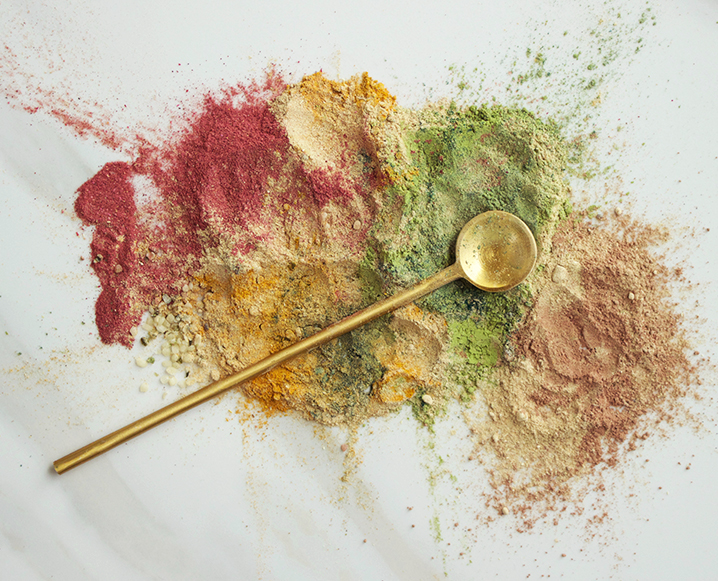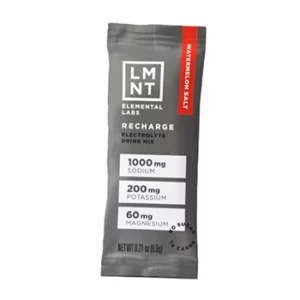Is a smoothie even worth drinking if it’s not busting stress, boosting focus, elevating energy and polishing our pores all at the same time? Not to us! We pack as many functional ingredients at as we can into each whirl of the blender.
As interest in adaptogens and functional herbs has reached a fever pitch, we’re inviting you to retrace your steps and take a closer look at the powerful ingredients you may be spiking those drinks with. All the excitement over combining herbs for maximum effect could be eclipsed a more serious topic: adaptogen side effects.
Could you be overdoing it with your fave adaptogens? Or just using herbs that aren’t suited to your needs? Costa Rica-born herbalist, founder of Anima Mundi and author of Healing Tonics, Adriana Ayales explains a few things we should all know about adaptogen side effects…
AshwagandhaBecause ashwagandha can have an immunosupressant effect, people with auto-immune diseases should be careful how it’s used. Particularly those with diseases such as rheumatoid arthritis, multiple sclerosis or lupus should not take this supplement overall as improper use might worsen symptoms. Some have had success or no side-effects by using very low doses, but it’s always best to consult a professional health practitioner.
Combining these treatments may counteract the effectiveness of immunosuppressive therapy. Ashwagandha may cause drowsiness and should not be used in conjunction with other sedative-type medications. Ashwagandha may increase thyroid hormone production and should not be used simultaneously with other thyroid hormone drugs.
AstragalusAstragalus tends to be a very friendly herb to most people, yet because of its immuno-modulating properties, it might raise a sensitivity to auto-immune disorders. Astragalus has deep immune activation, which might cause counteractions if you are taking immunosuppressant drugs.
Astragalus is considered pretty safe for many adults. The most commonly reported side effects are diarrhea, nausea and mild gastrointestinal effects. It might also affect blood-sugar levels and blood pressure and can be risky for people with certain blood-related health problems, such as blood disorders, diabetes or hypertension. It is inadvisable to take it with blood thinners, as it might lead to more bleeding. This especially applies if you are preparing for surgery or any kind of operation where blood-thinners are discouraged.
Pine PollenPine pollen is a powerful anti-viral and anti-inflammatory, to say the least! It is also commonly used as one of nature’s best testosterone replacement therapies. Testosterone is a steroid hormone. While it is present in women, it’s the male sex hormone that characterizes men.
Testosterone replacement therapy has many benefits. But unless you’re looking for a testosterone boost, there are also adverse side effects that you should look out for if you use it in higher doses than recommended. A common side-effect on a psychological level are mood swings, aggressiveness and impulsivity. On a physical level side effects may include weight gain, hair growth, oily skin or acne.
Yet just the right dose has a plethora of healing abilities, that to this day haven’t even been properly studied. If used wisely, it might just be your libido boost!
For those with tree-pollen allergies: If you have a severe histamine response to pollen and seasonal allergies, be careful with pine pollen dosage as it might trigger an allergic response. Avoid pine pollen if you experience swelling, itchiness or facial inflammation of any kind.
LicoriceLicorice is often used in formulations as a harmonizer. In Chinese medicine, for example, it’s often added because of its warming and nourishing qualities to the gut, assisting in the overall breakdown of other medicines.
If your body already runs “too hot,” licorice might not be your medicine, as it may increase your blood pressure. Refrain from using or eating licorice if you have a history of high blood pressure.
ShisandraThis miraculous “five-flavored berry” has historically been used in Chinese medicine to promote a balance between yin and yang. It’s said to help “calm the heart and quiet the spirit” by positively affecting the brain, kidneys, liver and lungs.
While it’s been used for generations safely and effectively, very few human trials have been performed using schisandra. Most studies are based on animals. The only potential side-effects discovered are that it can affect the way other medications or supplements are absorbed by the body. If you currently take prescriptions to treat any existing conditions, it’s best to talk to your doctor before beginning use.
Other studies have found that it might increase stomach acids, depending on your body type, increasing the possibility of peptic ulcers. This is highly unlikely, but if your body has a history of gastritis or extreme acidity, it’s best not to use – or consult your health care practitioner first.
Fo-Ti (He Shou Wu)He shou wu has been used for over two thousand years as a longevity herb in Asia. There is a traditional preparation of he shou wu that involves cooking it with black beans for a long period of time, usually using a proportion of ten parts he shou wu to one part black beans, until the soup has evaporated. The “prepared” roots are then dried and powdered for medicinal use. Using this root, raw or unprepared, is a strong laxative. Because it has become so popular, you must be sure you’re purchasing the “prepared” root, or you could have a gut reaction.
Potential adverse effects of this herb are mainly digestive-tract reactions, usually resulting in thin stool in cases where the herb is not tolerated, and occasional light abdominal pain, nausea and vomiting.
Learn more from Adriana with this list of 20 adaptogenic herbs and what they do,
and this slimming pineapple tonic.
The Chalkboard Mag and its materials are not intended to treat, diagnose, cure or prevent any disease. All material on The Chalkboard Mag is provided for educational purposes only. Always seek the advice of your physician or another qualified healthcare provider for any questions you have regarding a medical condition, and before undertaking any diet, exercise or other health-related programs.















